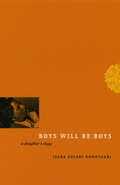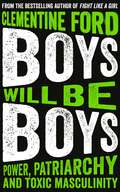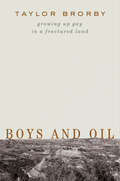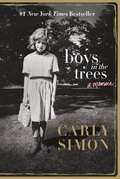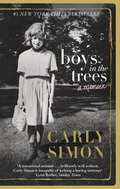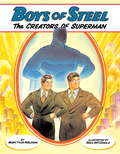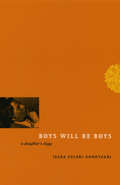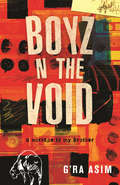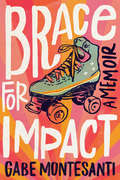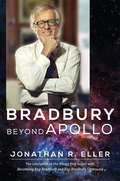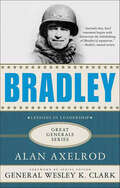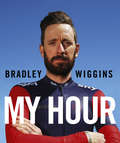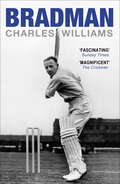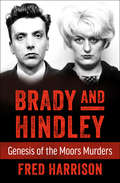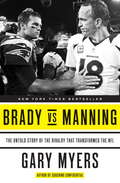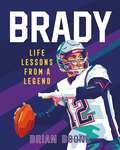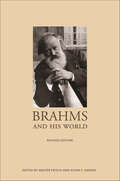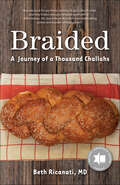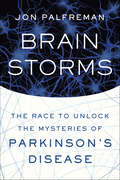- Table View
- List View
Boys Will Be Boys: A Daughter's Elegy
by Sara Suleri Goodyear“A daughter’s nostalgic tribute to her father . . . an intimate account of the socio-cultural fabric of the postcolonial world of Pakistan.” —Dr. Jharna Malaviya, Research Journal of English Language and LiteratureSara Suleri Goodyear’s Meatless Days is a finely wrought memoir of her girlhood in Pakistan after the 1947 partition. In Boys Will Be Boys, she returns—with the same treasury of language, humor, and passion—to her childhood and early adulthood to pay tribute to her father, the political journalist Z. A. Suleri (known as Pip, for his “patriotic and preposterous” disposition).Taking its title from that jokingly chosen by her father for his unwritten autobiography, Boys Will Be Boys dips in and out of Suleri Goodyear’s upbringing in Pakistan and her life in the United States, moving between public and private history and addressing questions of loss and cultural displacement through a resolutely comic lens. In this rich portrait, Pip emerges as a prodigious figure: an ardent agitator against British rule in the 1930s and 1940s, a founder of the Times of Karachi and the Evening Times, on-and-off editor of the Pakistan Times, for a brief time director of the Pakistan military intelligence service, and a frequently jailed antagonist of successive Pakistani leaders. To the author, though, he was also “preposterous . . . counting himself king of infinite space,” a man who imposed outrageously on his children. Suleri Goodyear invites the reader into an intimacy shaped equally by history and intensely personal detail, creating an elegant elegy for a man of force and contradiction. “On Judgment Day,” he told his daughter, “I will say to God, ‘Be merciful, for I have already been judged by my child.’”
Boys Will Be Boys: Power, Patriarchy and Toxic Masculinity
by Clementine FordThe incendiary new book about toxic masculinity and misogyny from Clementine Ford, author of the best-selling feminist manifesto, Fight Like A Girl. Fearless feminist heroine Clementine Ford&’s incendiary first book, Fight Like A Girl, is taking the world by storm, galvanising women to demand and fight for real equality and not merely the illusion of it. Now Boys Will Be Boys examines what needs to change for that equality to become a reality. It answers the question most asked of Clementine: 'How do I raise my son to respect women and give them equal space in the world? How do I make sure he's a supporter and not a perpetrator?' Ford demolishes the age-old assumption that superiority and aggression are natural realms for boys, and demonstrates how toxic masculinity creates a disturbingly limited and potentially dangerous idea of what it is to be a man. Crucially, Boys Will Be Boys reveals how the patriarchy we live in is as harmful to boys and men as it is to women and girls, and asks what we have to do to reverse that damage. The world needs to change and this book shows the way.
Boys and Oil: Growing Up Gay In A Fractured Land
by Taylor BrorbyFrom a young, gay environmentalist, a searing coming-of-age memoir set against the arid landscape of rural North Dakota, where homosexuality “seems akin to a ticking bomb.” “I am a child of the American West, a landscape so rich and wide that my culture trembles with terror before its power.” So begins Taylor Brorby’s Boys and Oil, a haunting, bracingly honest memoir about growing up gay amidst the harshness of rural North Dakota, “a place where there is no safety in a ravaged landscape of mining and fracking.” In visceral prose, Brorby recounts his upbringing in the coalfields; his adolescent infatuation with books; and how he felt intrinsically different from other boys. Now an environmentalist, Brorby uses the destruction of large swathes of the West as a metaphor for the terror he experienced as a youth. From an assault outside a bar in an oil boom town to a furtive romance, and from his awakening as an activist to his arrest at the Dakota Access Pipeline, Boys and Oil provides a startling portrait of an America that persists despite well-intentioned legal protections.
Boys in the Trees: A Memoir
by Carly SimonSimon's memoir reveals her remarkable life, beginning with her storied childhood as the third daughter of Richard L. Simon, the co-founder of publishing giant Simon & Schuster, her musical debut as half of The Simon Sisters performing folk songs with her sister Lucy in Greenwich Village, to a meteoric solo career that would result in 13 top 40 hits, including the #1 song "You're So Vain." She was the first artist in history to win a Grammy Award, an Academy Award and a Golden Globe Award, for her song "Let the River Run" from the movie Working Girl. The memoir recalls a childhood enriched by music and culture, but also one shrouded in secrets that would eventually tear her family apart. Simon brilliantly captures moments of creative inspiration, the sparks of songs, and the stories behind writing "Anticipation" and "We Have No Secrets" among many others. Romantic entanglements with some of the most famous men of the day fueled her confessional lyrics, as well as the unraveling of her storybook marriage to James Taylor.
Boys in the Trees: A Memoir
by Carly Simon#1 New York Times BestsellerA People Magazine Top Ten Book of the Year'A sensational memoir . . . brilliantly well written. Carly Simon is incapable of writing a boring sentence . . . you can forgive anything for the unparalleled brilliance of her writing' - Lynn Barber, Sunday Times'Hugely affecting memoir . . . heartfelt and remarkable' - Fiona Sturges, IndependentCarly Simon is a household name. She was the staple of the '70s and '80s Billboard charts and was famously married to James Taylor with whom she has two children. She has had a career that has spanned four decades, resulting in thirteen top 40 hits, including the Number 1 song 'You're So Vain', numerous Grammy Awards, a Golden Globe and an Academy Award. She was the first artist in history to win a Grammy Award, an Academy Award and a Golden Globe Award for her song 'Let the River Run' (from the film Working Girl). Boys in the Trees is a rhapsodic, beautifully composed memoir of a young woman's coming of age amongst the glamorous literati and intelligentsia of Manhattan (her father was Richard Simon, co-founder of publishing giant Simon & Schuster), a reflection on a life begun amidst secrets and shame, and a powerful story of the strength to leave that all behind and forge a path of art, music and love in the Golden Age of folk and rock.At once an insider's look into a life in the spotlight, a lyric reflection on a particular time in our culture's history, and a beautiful memoir about the pains and joys of love and art, Boys in the Trees is the story Carly Simon has long been waiting to tell the world.Praise for the US edition:'One of the best celebrity memoirs of the year' Hollywood Reporter'Intelligent and captivating' People'Compelling' Rolling Stone
Boys of Steel: The Creators of Superman
by Ross Macdonald Marc Tyler NoblemanJerry Siegel and Joe Shuster, two high school misfits in Depression-era Cleveland, were more like Clark Kent--meek, mild, and myopic--than his secret identity, Superman. Both boys escaped into the worlds of science fiction and pulp magazine adventure tales. Jerry wrote his own original stories and Joe illustrated them. In 1934, the summer they graduated from high school, they created a superhero who was everything they were not. It was four more years before they convinced a publisher to take a chance on their Man of Steel in a new format--the comic book. The author includes a provocative afterword about the long struggle Jerry and Joe had with DC Comics when the boys realized they had made a mistake in selling all rights to Superman for a mere $130.
Boys will be Boys: A Daughter's Elegy
by Sara Suleri GoodyearTaking her title from that jokingly chosen by her father for his unwritten autobiography, Boys will be boys dips in and out of Suleri Goodyears' upbringing in Pakistan and her life in the United States.
Boyz n the Void: a mixtape to my brother
by G'Ra AsimWriting to his brother, G'Ra Asim reflects on building his own identity while navigating Blackness, masculinity, and young adulthood--all through wry social commentary and music/pop culture critiqueHow does one approach Blackness, masculinity, otherness, and the perils of young adulthood? For G'Ra Asim, punk music offers an outlet to express himself freely. As his younger brother, Gyasi, grapples with finding his footing in the world, G'Ra gifts him with a survival guide for tackling the sometimes treacherous cultural terrain particular to being young, Black, brainy, and weird in the form of a mixtape. Boyz n the Void: a mixtape to my brother blends music and cultural criticism and personal essay to explore race, gender, class, and sexuality as they pertain to punk rock and straight edge culture. Using totemic punk rock songs on a mixtape to anchor each chapter, the book documents an intergenerational conversation between a Millennial in his 30s and his Generation Z teenage brother. Author, punk musician, and straight edge kid, G'Ra Asim weaves together memoir and cultural commentary, diving into the depths of everything from theory to comic strips, to poetry to pizza commercials to mapping the predicament of the Black creative intellectual. With each chapter dedicated to a particular song and placed within the context of a fraternal bond, Asim presents his brother with a roadmap to self-actualization in the form of a Doc Martened foot to the behind and a sweaty, circle-pit-side-armed hug. Listen to the author&’s playlist while you read! Access the playlist here: https://sptfy.com/a18b
Brace for Impact: A Memoir
by Gabe MontesantiA powerful and redemptive story of how the dazzling world of roller derby helped one young woman transform her fear and self-doubt into gutsy, big-hearted, adventurous living &“A universal story of healing and triumph, made all the more beautiful, wild, and free by Gabe&’s fierce love for roller derby and her team, who become her family.&”—ABBY WAMBACH, Olympian, activist, and author of the #1 New York Times bestseller WolfpackGrowing up queer in a conservative Midwestern town, Gabe Montesanti never felt comfortable in her own skin. A competitive swimmer, she turned to perfectionism and self-control to create a sense of safety, only to develop an eating disorder and constantly second-guess her instincts. When she enters graduate school in St. Louis, she is determined to put the baggage of her childhood behind her. With no prior experience, she joins Arch Rival, one of the top-ranked roller derby leagues in the world. Gabe instantly falls in love with the sport&’s roughness, intensity, and open embrace of people who are literally and figuratively scarred. She soon finds community and a sense of belonging, reveling in the tattoos, glitter, and campiness. But when Gabe suffers a catastrophic injury, she can no longer ignore the parallels between the physicality of roller derby and the unresolved trauma of her upbringing. Rendered inactive, forced to be still, Gabe realizes she needs to heal her emotional wounds as much as her physical ones; she must confront her fear and self-diminishment in order to feel truly alive.Told with unflinching honesty and a giant dose of wonder, Brace for Impact is a tender, inspiring memoir about the everyday heroism of pursuing a life less ordinary, and the deeply human need to be at peace with who you are.
Brad and Angelina: Truth and Lies
by Chas Newkey-BurdenBrad Pitt and Angelina Jolie are the best-known and most talked-about couple in the world. When they got together in 2005 it made headlines worldwide - everyone wanted to know the full story of what had happened: had Brad cheated on Jen? How long had the affair been going on? Just what happened on the set of Mr and Mrs Smith to break up Hollywood's golden couple?Since the birth of 'Brangelina', Brad and Ange have never been out of the spotlight. Whether it's speculation about their wild and incredible sex life or the apparent cracks in their relationship, the public are fascinated. But never before has a book told the full story - of the relationships and lives that Brad, Jen and Angelina all led before fate brought them together, of the irresistible chemistry that drew Brad and Angelina together, of their relationship together, from its glorious honeymoon period through to its shaky present. Finally, Chas Newkey-Burden separates the rumours from the reality and the truth from the lies.This is the astonishing, electrifying and untold story of Brangelina. Once you pick up this book you will not be able to put it down...
Bradbury Beyond Apollo
by Jonathan R. EllerCelebrated storyteller, cultural commentator, friend of astronauts, prophet of the Space Age—by the end of the 1960s, Ray Bradbury had attained a level of fame and success rarely achieved by authors, let alone authors of science fiction and fantasy. He had also embarked on a phase of his career that found him exploring new creative outlets while reinterpreting his classic tales for generations of new fans. Drawing on numerous interviews with Bradbury and privileged access to personal papers and private collections, Jonathan R. Eller examines the often-overlooked second half of Bradbury's working life. As Bradbury's dreams took him into a wider range of nonfiction writing and public lectures, the diminishing time that remained for creative pursuits went toward Hollywood productions like the award-winning series Ray Bradbury Theater. Bradbury developed the Spaceship Earth narration at Disney's EPCOT Center; appeared everywhere from public television to NASA events to comic conventions; published poetry; and mined past triumphs for stage productions that enjoyed mixed success. Distracted from storytelling as he became more famous, Bradbury nonetheless published innovative experiments in autobiography masked as detective novels, the well-received fantasy The Halloween Tree and the masterful time travel story "The Toynbee Convector." Yet his embrace of celebrity was often at odds with his passion for writing, and the resulting tension continuously pulled at his sense of self. The revelatory conclusion to the acclaimed three-part biography, Bradbury Beyond Apollo tells the story of an inexhaustible creative force seeking new frontiers.
Bradley (Great Generals Series)
by Alan AxelrodA study of the life and influence of Omar Nelson Bradley, five-star US Army general, World War II leader, and military policy maker.Alan Axelrod applies his signature insight and compelling prose to the life, strategy and legacy of the general Bradley who remains the model for all commanders today as the man who revolutionized the National Guard, shaped the US Army’s focus on the individual soldier, and emphasized cooperation and coordination among the military services—a cornerstone of modern US military doctrine.Dubbed by the World War II press as “the GI General” because of his close identification with his men, Omar Bradley rose to command the US 12th Army Group in the European Campaign. By the spring of 1945, this group contained 1.3 million men—the largest exclusively American field command in US history.Mild mannered, General Bradley was a dedicated mentor, the creator of the Officer Candidate School system, and a methodical tactician who served through World War II. Then, as a five-star general, he lifted the Veterans Administration from corruption and inefficiency to a model government agency, served as US Army chief of staff, first chief of the Joint Chiefs of Staff, and head of NATO.
Bradley Wiggins (EDGE: Dream to Win #11)
by Roy AppsBradley Wiggins is a national hero - the first British person to win the Tour de France - EVER. Read his story from his childhood years right up to when he crossed the finish line in Paris, 2012. It takes blood, sweat and tears to get to the top of any sport, and these short, inspirational biographies show just how tough it can be. Focusing on top athletes and sport personalities, each dramatic story brings to life the skill, determination and luck needed to break through into top level competition.This title is published by Franklin Watts EDGE, which produces a range of books to get children reading with confidence. We believe this title will be of interest to readers aged 7+ and to older readers who struggle with reading. EDGE - for books kids can't put down.
Bradley Wiggins: My Hour
by Bradley WigginsOne man, one bike, one hour. The inside story of Bradley Wiggins's record-breaking rideFor 60 minutes this summer, the British public stopped what they were doing, switched on their radios, their TVs, refreshed their Twitter feeds and followed Bradley Wiggins’s attempt to break one of sport’s most gruelling records: The Hour. The premise is simple enough: how far can you cycle in one hour. But it is thought to be one of the toughest events an athlete can endure, both physically and psychologically. Eddy Merckx, cycling’s über-champ, called it the hardest thing he ever did. Wiggins, like many before him, discovered the unique pain of pushing yourself as hard as you can for 60 minutes.In this revealing book, Bradley Wiggins takes you behind the scenes of his record attempt. From planning to preparation, to training to execution, Bradley shares his thoughts on his sacrifices, his heroes, and the people who have supported him along the way as well as what’s to come as he heads towards the twilight of his stellar career.Supported by stunning photography, My Hour is a fitting celebration of one of Britain’s best-loved sportsmen in his finest hour.
Bradman
by Lord Charles WilliamsA masterly portrait of cricket's supreme batsman and Australia's greatest hero.Uniquely among biographers of Don Bradman, Charles Williams sets his subject's cricketing achievements within the context of a crucial period in the history of modern Australia, a time when, as the country felt her way towards something that the world would recognise as 'nationhood', Bradman became a focus for national aspirations, a figure of unique status.Brilliantly revealing the phenomenon of Bradman's cricketing genius - and the tensions that genius created for the man, his family, team-mates and the game's administrators - Williams' story is as much about Australia as it is a great Australian.
Bradman: An Australian Hero
by Charles WilliamsA masterly portrait of cricket's supreme batsman and Australia's greatest hero.Uniquely among biographers of Don Bradman, Charles Williams sets his subject's cricketing achievements within the context of a crucial period in the history of modern Australia, a time when, as the country felt her way towards something that the world would recognise as 'nationhood', Bradman became a focus for national aspirations, a figure of unique status.Brilliantly revealing the phenomenon of Bradman's cricketing genius - and the tensions that genius created for the man, his family, team-mates and the game's administrators - Williams' story is as much about Australia as it is a great Australian.
Brady and Hindley: Genesis of the Moors Murders
by Fred HarrisonThe shocking true crime story of child murderers Ian Brady and Myra Hindley, Great Britain&’s most horrific serial killers. During the early 1960s, just as Beatlemania was exploding throughout the United Kingdom, a pair of psychopathic British killers began preying on the very young, innocent, and helpless of Greater Manchester. Between 1963 and 1965, Ian Brady and his lover and partner, Myra Hindley, were responsible for the abduction, rape, torture, and murder of five young victims, ranging in age from ten to seventeen years old. The English press dubbed the grisly series of homicides &“the Moors Murders,&” named for the desolate landscape where three of the corpses were eventually discovered. Based in part on the author&’s face-to-face prison interviews with the killers, Fred Harrison&’s fascinating and disturbing true crime masterwork digs deeply into Brady and Hindley&’s personal histories to examine the factors that led to their mutual attraction and their evolution into the UK&’s most notorious pair of human monsters. It was during these interviews that new details about the killers&’ terrible crimes surfaced, compelling the police to reopen what was arguably the most shocking and sensational homicide case in the annuls of twentieth-century British crime. With a new introduction by the author, meticulously researched and compellingly written, Brady and Hindley is the definitive account of Britain&’s most hated serial killers.
Brady vs Manning
by Gary MyersFrom Acclaimed sports journalist Gary Myers comes the definitive inside account of the greatest rivalry in NFL historyTom Brady and Peyton Manning are perhaps the two greatest quarterbacks of all time. They are living legends who have come to embody the quarterback position and shape an entire generation of the NFL. They have also been fierce rivals every step of the way, and their many epic duels have not only ranked among the best and most exciting games ever played, they have fundamentally shaped the lives of and careers of both men.But for all their shared brilliance, they are a study in contrasts. Tom is the underdog turned ultimate winner, an unheralded draft pick who went on to win a miraculous Super Bowl and become the leader of one of the NFL's greatest dynasties. He is as firmly associated with big game brilliance as anyone who has ever played. Meanwhile Peyton was born into NFL royalty and a mountain of outsized expectations, yet somehow lived up to and exceeded all the hype, claiming virtually every passing record along his path to football immortality.The contrast in greatness--between the overachieving underdog and the crown prince of football, between postseason brilliance and statistical dominance--has served as an endless source of fascination for fans and media, and over the years as the two players have faced off again and again in classic games, the argument has only intensified. But until now, there has never been a definitive treatment of the debate that tells the real story. What do Tom and Peyton actually think of each other? What do their coaches think of them? What about teammates and opposing players? What are they like behind closed doors and in the locker room, and how does that influence their careers? How did their vastly different upbringings shape them, and how has each handled the injuries, setbacks and defeats they've dealt with over their careers? In this extraordinary book, veteran NFL correspondent Gary Myers tackles this subject from every angle and with unprecedented access and insight, drawing on a huge number of never-before-heard interviews with Brady and Manning, their coaches, their families, and those who have played with them and against them. The result is a remarkable collection of the most entertaining and revealing stories ever told about Peyton and Tom, from how they developed their vastly different leadership styles, to the unlikely friendship they've built over the years, to their respective exploits as locker room pranksters. Wildly entertaining and deeply thought-provoking, Brady vs Manning is essential reading for anyone who truly wants to understand these extraordinary players.
Brady vs Manning: The Untold Story of the Rivalry That Transformed the NFL
by Gary MyersNew York Times Bestseller From Acclaimed sports journalist Gary Myers comes the definitive inside account of the greatest rivalry in NFL history <P><P>Tom Brady and Peyton Manning are perhaps the two greatest quarterbacks of all time. They are living legends who have come to embody the quarterback position and shape an entire generation of the NFL. They have also been fierce rivals every step of the way, and their many epic duels have not only ranked among the best and most exciting games ever played, they have fundamentally shaped the lives of and careers of both men. <P><P>But for all their shared brilliance, they are a study in contrasts. Tom is the underdog turned ultimate winner, an unheralded draft pick who went on to win a miraculous Super Bowl and become the leader of one of the NFL's greatest dynasties. He is as firmly associated with big game brilliance as anyone who has ever played. <P><P>Meanwhile Peyton was born into NFL royalty and a mountain of outsized expectations, yet somehow lived up to and exceeded all the hype, claiming virtually every passing record along his path to football immortality.The contrast in greatness--between the overachieving underdog and the crown prince of football, between postseason brilliance and statistical dominance--has served as an endless source of fascination for fans and media, and over the years as the two players have faced off again and again in classic games, the argument has only intensified. But until now, there has never been a definitive treatment of the debate that tells the real story. <P><P>What do Tom and Peyton actually think of each other? What do their coaches think of them? What about teammates and opposing players? What are they like behind closed doors and in the locker room, and how does that influence their careers? How did their vastly different upbringings shape them, and how has each handled the injuries, setbacks and defeats they've dealt with over their careers? <P><P> In this extraordinary book, veteran NFL correspondent Gary Myers tackles this subject from every angle and with unprecedented access and insight, drawing on a huge number of never-before-heard interviews with Brady and Manning, their coaches, their families, and those who have played with them and against them. <P><P>The result is a remarkable collection of the most entertaining and revealing stories ever told about Peyton and Tom, from how they developed their vastly different leadership styles, to the unlikely friendship they've built over the years, to their respective exploits as locker room pranksters. Wildly entertaining and deeply thought-provoking, Brady vs Manning is essential reading for anyone who truly wants to understand these extraordinary players.From the Hardcover edition.
Brady: Life Lessons From a Legend (Life Lessons from a Legend)
by Brian BooneBrady: Life Lessons From a Legend features success strategies from the greatest quarterback of all time“If you don’t play to win, don’t play at all.” From an underrated recruit, to a second-string player with the chance of a lifetime, to the best quarterback in history, Tom Brady is a success story for the ages. His unshakable belief in himself and his relentless dedication to improving his game brought him more than two decades of record-breaking career highs. No other NFL player has as many Super Bowl wins, game wins, touchdown passes, passing yards, or completed passes as TB12.Brady: Life Lessons from a Legend is a front-row seat to the struggles and triumphs of Brady’s incredible career as an unstoppable athlete and a savvy businessman. His unique journey from the University of Michigan to the Patriots to the Buccaneers is a master class in chasing excellence, even when others doubt your potential. Anyone with a lofty dream will benefit from the insights and wisdom that helped Brady become the G.O.A.T.- Inspiring quotes from Brady himself- A biographical look at Brady’s early years, his rise to fame, and his most spectacular achievements - Original full-color art that captures the spirit of a champion- Guiding truths and hard-earned lessons to help you crush your own goals
Brahms and His World: Revised Edition (The Bard Music Festival #20)
by Walter Frisch and Kevin C. KarnesSince its first publication in 1990, Brahms and His World has become a key text for listeners, performers, and scholars interested in the life, work, and times of one of the nineteenth century's most celebrated composers. In this substantially revised and enlarged edition, the editors remain close to the vision behind the original book while updating its contents to reflect new perspectives on Brahms that have developed over the past two decades. To this end, the original essays by leading experts are retained and revised, and supplemented by contributions from a new generation of Brahms scholars. Together, they consider such topics as Brahms's relationship with Clara and Robert Schumann, his musical interactions with the "New German School" of Wagner and Liszt, his influence upon Arnold Schoenberg and other young composers, his approach to performing his own music, and his productive interactions with visual artists. The essays are complemented by a new selection of criticism and analyses of Brahms's works published by the composer's contemporaries, documenting the ways in which Brahms's music was understood by nineteenth- and early twentieth-century audiences in Europe and North America. A new selection of memoirs by Brahms's friends, students, and early admirers provides intimate glimpses into the composer's working methods and personality. And a catalog of the music, literature, and visual arts dedicated to Brahms documents the breadth of influence exerted by the composer upon his contemporaries.
Braided: A Journey of a Thousand Challahs
by Beth RicanatiWhat if you could bake bread once a week, every week? What if the smell of fresh bread could turn your house into a home? And what if the act of making the bread―mixing and kneading, watching and waiting―could heal your heartache and your emptiness, your sense of being overwhelmed? It can. This is the surprise that physician-mother Beth Ricanati learned when she started baking challah: that simply stopping and baking bread was the best medicine she could prescribe in a fast-paced world.2018 National Jewish Book Award Finalist2018 Foreword INDIES Winner2019 Readers' Favorite Awards Finalist2019 Wilbur Award, Nonfiction Winner2020 Eric Hoffer Award, First Horizon Award Finalist2020 Eric Hoffer Award, 1st runner up in Nonfiction2020 Eric Hoffer Award, Grand Prize Shortlist Finalist2020 Next Generation Indie Book Awards Finalist2020 Next Generation Indie Book Awards Winner
Brain Attack: My Journey of Recovery from Stroke and Aphasia
by David Dow Carol Dow-RichardsWhen David Dow was ten years old, his life suddenly changed due to a massive stroke. The stroke left him paralyzed on the right side and gave him aphasia, leaving him unable to speak, read, or write. Brain Attack shares David's story with frankness, humor, and most of all, with hope.
Brain Storms: The Race to Unlock the Mysteries of Parkinson's Disease
by Jon Palfreman“The best and clearest book I’ve encountered on the current state of knowledge about Parkinson’s Disease . . . a master storyteller.” —The Tampa TribuneSeven million people worldwide suffer from Parkinson’s, and doctors, researchers, and patients continue to hunt for a cure. In Brain Storms, Peabody Award–winning journalist Jon Palfreman tells their story—a story that became his own when he was diagnosed with the debilitating illness.Palfreman chronicles how scientists have worked to crack the mystery of what was once called the shaking palsy, from the earliest clinical descriptions of tremors, gait freezing, and micrographia to the cutting edge of neuroscience, and charts the victories and setbacks of a massive international effort to best the disease. He takes us back to the 1950s and the discovery of L-dopa. He delves into other therapeutic approaches to this perplexing condition, from partial lobotomies and deep brain stimulation to neural grafting. And he shares inspiring stories of brave individuals living with Parkinson’s, from a former professional ballet dancer who tricks her body to move freely again to a patient who cannot walk but astounds doctors when he rides a bicycle with no trouble at all.The race is on to stop or reverse neurodegenerative conditions like Parkinson’s and Alzheimer’s. Brain Storms is the long-overdue, riveting, and deeply personal story of that race, and a passionate, insightful look into the lives of those affected.“Well written and poignant.” —The Wall Street Journal“[Palfreman] has an excellent grasp on the science behind the disease . . . but it is as a human story that the book is most compelling.” —The Times Literary Supplement“Clean prose, clear thought and fascinating stories.” —The Miami Herald“Extraordinary case studies abound.” —Nature“Fast-paced, captivating . . . part scientific investigation, part medical detective story, and part memoir . . . it opens wide a window into the world of Parkinson’s.” —Publishers Weekly (starred review)
Brain Surgeon: A Doctor's Inspiring Encounters with Mortality and Miracles
by Keith Black Arnold MannWelcome to tiger country: the treacherous territory where a single wrong move by a brain surgeon can devastate or end a patient's life. This is the terrain world-renowned neurosurgeon Keith Black, MD, enters every day to produce virtual medical miracles. Now, in BRAIN SURGEON, Dr. Black invites readers to shadow his breathtaking journeys into the brain as he battles some of the deadliest and most feared tumors known to medical science. Along the way, he shares his unique insights about the inner workings of the brain, his unwavering optimism for the future of medicine, and the extraordinary stories of his patients-from ministers and rock stars to wealthy entrepreneurs and uninsured students-whom he celebrates as the real heroes. BRAIN SURGEON offers a window into one man's remarkable mind, revealing the anatomy of the unflinching confidence of this master surgeon, whose personal journey brought him from life as a young African-American boy growing up in the civil rights era South to the elite world of neurosurgery. Through Dr. Black's white-knuckle descriptions of some of the most astonishing medical procedures performed today, he reveals the beauty and marvel of the human brain and the strength and heroism of his patients who refuse to see themselves as victims. Ultimately, BRAIN SURGEON is an inspiring story of the struggle to overcome odds--whether as a man, a doctor, or a patient. "BRAIN SURGEON is an inspirational book about true heroes--readers will marvel at Keith Black's achievements both as a doctor and as a man, and will be in awe of his patients' courage and will to survive." --Denzel Washington. I often get asked who the best doctor is in the world for various ailments. Truth is, it's a hard question. When it comes to brain tumors, however, the answer is pretty clear: Keith Black. He is the doctor people find when all the other doctors have given up. He is that guy. This book is about the heroic patients he has already helped and saved. If you want a rare, behind-the-curtain look at the life of one of the most pre-eminent neurosurgeons in the world, pick up Brain Surgeon. And Keith, from one brain surgeon to another: thank you for honoring our profession. Well done. --Sanjay Gupta, MD, Chief Medical Correspondent, CNN and New York Times bestselling author of Chasing Life.
